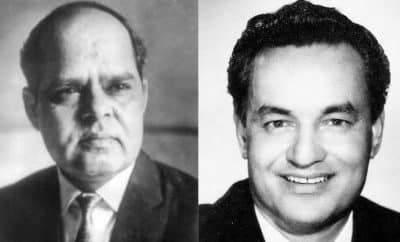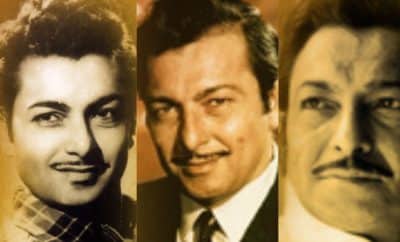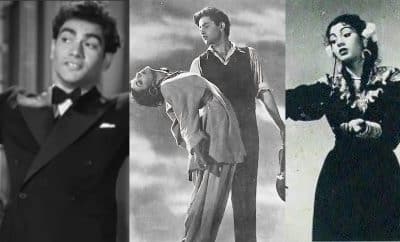Collections
S.D. Burman and Mukesh – A Rare but Remarkable Combo
All the golden era playback singers were indeed God’s gift to mankind (not to discount the contribution by the composers, the lyricists, and the musicians, of course!). Some of them were all-rounder and versatile, while some had a limited range but some unique strengths. While the former set of singers ruled the landscape of film music, the singers in the latter set too carved out a niche for themselves despite the limited range and created their own special places in the hearts of the music lovers.
One of the predominant names in the latter cadre is Mukesh. He remained the inimitable and unparalleled voice of melancholy for over three decades. Due to the inherent deep timbre and the nasal twang, he could paint several shades of pathos effectively. This very texture of his voice made it suitable also for romantic numbers. While a few composers perceived these unique traits of Mukesh’s voice as limitations, a few others capitalised on these very “limitations” and created numerous memorable masterpieces in alliance with him. As he was the ghost voice of Raj Kapoor, his preferred composers Shankar – Jaikishan used Mukesh’s voice extensively across several genres. Besides SJ, Anil Biswas, Salil Chowdhury, Roshan, Kalyanji – Anandji and Laxmikant Pyarelal also used Mukesh conspicuously in their music. Many others however remained selective about him.
Sachin Dev Burman, known to be quite adamant about his choices, was one such composer. Of course, this stubbornness was not for nothing. His insistence on a particular singer, instrument, or musician for a particular song would only enrich the composition. Looking at many of his compositions perfectly befitting the situation, it seems as though he could visualise the song even before it the director conceived it! After all, he was the maestro with a Midas touch! Mohammed Rafi and Kishore Kumar were S.D. Burman’s mainstays among the male singers, and he used other singers like Talat Mahmood and Mukesh only exceptionally, when he was sure that no one else could do justice to those particular compositions.
Interestingly, Mukesh’s association with S.D. Burman started in S.D. Burman’s early years in Hindi cinema with Vidya (1948) and lasted till Barood (1976), which was almost the end of his career. But in this span 28 years, Mukesh sang only 12 odd songs under S.D. Burman’s music direction. Another interesting fact is that in the initial years of S.D. Burman’s career, when both Kishore Kumar and Mohammed Rafi had sung only a song or two for him, Mukesh had six S.D. Burman songs to his account. This works out to 50% of their total joint repertoire and is most probably the highest number of songs that a male singer rendered for S.D. Burman in the 1940s.
After S.D. Burman’s Hindi career took off with Mashal (1950), Kishore Kumar started featuring in his music frequently, followed by Mohammed Rafi’s frequent appearance starting the late 1950s. However, Mukesh became a rare phenomenon in the Burman camp from the 1950s, with at the most a couple of songs on an average each in the next three decades.
Nevertheless, the songs that Mukesh has rendered under S.D. Burman’s baton, albeit only a handful, are all mellifluous and outstanding.
1. Bahe Na Kabhi Nain Se Neer (Vidya – 1948)
This is a melancholic song filmed on a young Dev Anand, who is submerged in the grief of missing the loved one but is trying to control his sentiments and making himself understand the weird way of love. When we think of the songs that S.D. Burman composed for Dev Anand, we can’t think of any singer other than Rafi or Kishore. But the first solo that S.D. Burman composed for Dev Anand is sung by Mukesh – surprised, aren’t you?
2. Laayi Khushi Ki Duniya (Vidya – 1948)
The same film features this beautiful romantic duet by Mukesh and Suraiya, filmed on herself and Dev Anand, who make an adorable couple. The song reflects their deep romance on screen, which also existed between them off screen in the real life.
Next year, Mukesh sang four duets (three with Shamshad Begum and one with Geeta Dutt) for a single film – Shabnam (1949). This film too has a rare combination, viz. Mukesh and Dilip Kumar.
3. Kismat Mein Bichhadna Tha (Shabnam – 1949)
This is a soulful Mukesh – Geeta Dutt (then Geeta Roy) duet filmed on Dilip Kumar and Kamini Kaushal, who are distantly complaining about separation and justifying respectively.
4. Chal Ri Sajni, Ab Kya Soche? (Bombai Ka Babu – 1960)
After the late 1940s, Mukesh did not appear in S.D. Burman’s music for over a decade. Though the gap was long, S.D. Burman gave him this excellent heart wrenching composition, which was completely within Mukesh’s forte and to which he did more than complete justice. Majrooh Sultanpuri’s words amazingly describe the upwelling feelings in the mind of a girl who is being bid adieu to after her marriage, and that of her father. The lyrics, together with Mukesh’s soulful rendition make us also feel that moment. Wonderful use of chorus superbly portrays the surge of feelings.
5. Aye Dil-E-Aawaara Chal (Dr. Vidya – 1962)
This is a peppy song expressing the hero’s excitement as he is about to meet his love. The song is penned by Majrooh Sultanpuri. Mukesh has sung this romantic number as proficiently as he would render a sad song.
6. Ye Kisne Geet Chheda (Meri Surat Teri Aankhen – 1963)
Mukesh and Suman Kalyanpur have given their best in this sweet romantic duet penned by Shailendra and decorated by S.D. Burman beautifully with guitar, mandolin, flute and saxophone. The orchestration depicts the joy in the lovers’ mind very well.
7. O Jaanewaale, Ho Sake To Laut Ke Aana (Bandini – 1963)
When Kalyani (Nutan), broken by her unsuccessful love and father’s misery, is about to leave her village clandestinely, the song plays in the background, as though the village, it’s roads and lanes, the river, the trees, everything is trying to pull her back. Pathos in Mukesh’s voice perfectly compliment the pain in Kalyani’s eyes. This song too has a beautiful use of chorus, representing the collective voice of the village surroundings. Shailendra has adeptly painted a poignant word picture with a rustic touch.
8. Baaghon Mein Kaise Ye Phool Khilte Hain? (Chupke Chupke – 1975)
Another long gap, and S.D. Burman gave Mukesh another song directly in the next decade. This is a lovely romantic Mukesh – Lata Mangeshkar duet from the evergreen classic, filmed on Dharmendra and Sharmila Tagore. The song is written by Anand Bakshi.
9. Tu Shaitaanon Ka Sardaar Hai (Barood – 1976)
This is a playful song filmed on father and son – Dr. Shriram Lagoo and Master Raju –enjoying good time together. The song is sung by Mukesh, and the actor – singer Shivani Kolhapure, sister of Padmini Kolhapure, wife of Shakti Kapoor and mother of Sharddha Kapoor. Anand Bakshi is the lyricist.
https://www.youtube.com/watch?v=oSTrXAZl5u0
This is all about their joint work comprising only so much as a dozen odd songs. Despite the small magnitude, their songs stand out in the respective soundtracks, and have a special place in their respective repertoires.




Amol
October 1, 2022 at 9:12 am
K Yogesh.. Amazing write up. You are exceptionally gifted and talented when you write here. I was so happy to see some good songs with SD. Never knew some of the songs are of SD . Mukesh Bhaiyaa is always my favourire.. Unique and touches your heart and soul at the sane time.
Bahe Na Kabhi Nain Se Neer (Vidya – 1948) Dev SD and Mukesh the rarest of the combination.
The song i liked is O Jannewale Ho Sake to Laut ke aana.
YOGESH
October 1, 2022 at 12:45 pm
Thanks a lot, Amol!
O jaanewaale is a soulful and haunting song indeed!